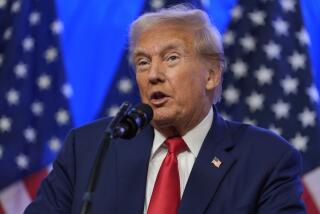Saudi Prince Pays $1 Billion for U.S. Shares During Market Downturn
- Share via
Finally: The answer to the question of who was buying stocks in mid-April when so many other investors were selling.
Prince Alwaleed bin Talal, a 43-year-old nephew of Saudi Arabia’s King Fahd, said Tuesday that he spent $1 billion in recent weeks and months buying shares in 15 U.S. companies, including Amazon.com, Walt Disney, Coca-Cola and AT&T.;
“We bought all these companies, which are here for the long run, after their share prices had collapsed by as much as 70%,” Alwaleed said. “We are not ‘old economy,’ we are not ‘new economy.’ We go everywhere there is value and growth potential.”
Alwaleed, ranked No. 8 in a Forbes magazine list of the world’s wealthiest people, regularly makes investments in companies with strong brand names.
The latest investments the prince disclosed include $200 million for WorldCom shares, the single biggest investment, followed by AT&T; at $150 million.
The remainder was divided into $50-million portions and shared among Amazon, Disney, Coke, McDonald’s, Ford Motor, Gillette, Procter & Gamble, EBay, Internet Capital Group, Priceline.com, Infospace and DoubleClick.
“Between December 1999 and February 2000, everyone deserted old-world stocks and went into the Internet, causing all these old established companies to crash, and I emphasize ‘crashed,’ so I bought slowly but surely,” Alwaleed said.
“In April and May, everybody abandoned the Internet stocks and went back into the old world. Then Internet shares crashed, so I went in there. We screened 100 Internet companies, and we concluded that the six companies we chose were here to stay for a long time.”
The purchases increase the prince’s technology, media and telecom portfolio to $7.8 billion, and follow a $1-billion investment he announced April 6 in shares of such companies as America Online, Compaq and Xerox.
The prince, who is the single biggest shareholder of Citigroup, said in August that U.S. stocks were too expensive, especially Internet companies, and he wouldn’t make any new investments until a “major correction” occurred.
He obviously figured the March/April swoon was major enough.
More to Read
Inside the business of entertainment
The Wide Shot brings you news, analysis and insights on everything from streaming wars to production — and what it all means for the future.
You may occasionally receive promotional content from the Los Angeles Times.










